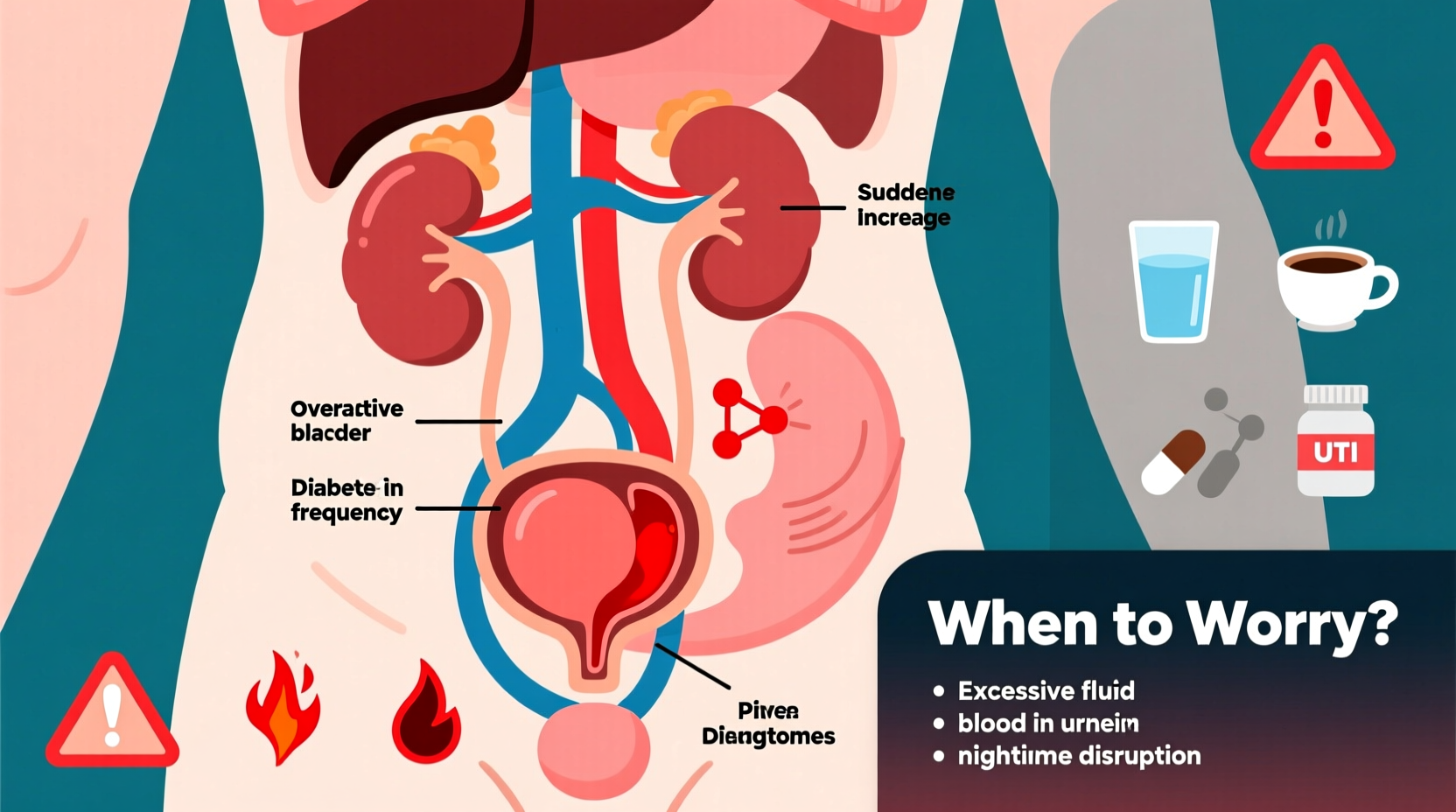Sudden frequent urination can be both inconvenient and concerning. You might find yourself making repeated trips to the bathroom during the day—or even waking up multiple times at night. While occasional changes in urinary habits are normal, a persistent or abrupt increase in frequency may signal an underlying health issue. Understanding the potential causes and knowing when to seek medical advice is essential for timely intervention and peace of mind.
Common Causes of Sudden Frequent Urination

Frequent urination—defined as needing to urinate more than eight times in 24 hours—can stem from a variety of sources. Some are harmless and temporary; others require medical attention. Here are the most frequent culprits:
- Increased fluid intake: Drinking more water, coffee, tea, or alcohol naturally leads to more urine production.
- Urinary tract infection (UTI): One of the most common causes, especially in women. A UTI irritates the bladder, creating a constant urge to go—even when little urine is produced.
- Diabetes (type 1 or type 2): High blood sugar forces the kidneys to work harder, pulling excess glucose into the urine and increasing volume.
- Pregnancy: The growing uterus puts pressure on the bladder, reducing its capacity and triggering more frequent urges.
- Overactive bladder (OAB): A condition where the bladder muscles contract involuntarily, leading to sudden urges and frequent voiding.
- Medications: Diuretics (\"water pills\") prescribed for high blood pressure increase urine output intentionally.
- Caffeine and alcohol: Both act as diuretics and bladder irritants, stimulating increased urination.
When Frequent Urination Signals a Serious Condition
While many causes are benign, sudden and persistent frequent urination can sometimes point to more serious health problems. Be alert to these red flags:
- Excessive thirst and unexplained weight loss: Classic signs of diabetes mellitus. The body tries to flush out excess sugar through urine, which increases volume and frequency.
- Pain or burning during urination: Often indicates a UTI or sexually transmitted infection (STI).
- Nocturia (waking up at night to pee) more than twice: Could suggest diabetes, prostate issues (in men), or heart failure.
- Cloudy, bloody, or foul-smelling urine: Signs of infection or kidney stones.
- Difficulty starting or maintaining a urine stream: In men, this may indicate an enlarged prostate or prostatitis.
“Frequent urination alone isn’t always dangerous, but when combined with symptoms like fatigue, thirst, or pain, it’s a signal to get checked.” — Dr. Lena Patel, Urologist at Boston Medical Center
Do’s and Don’ts: Managing Urinary Frequency
| Do’s | Don’ts |
|---|---|
| Stay hydrated, but pace fluid intake throughout the day | Drink large amounts of fluid right before bed |
| Limited caffeine and alcohol, especially in the evening | Ignore pain or burning during urination |
| Empty your bladder fully when you go | Hold urine for long periods |
| Practice pelvic floor exercises (Kegels) | Self-diagnose or delay seeing a doctor if symptoms persist |
| Keep a symptom and voiding diary | Assume it’s “just aging” without evaluation |
Real-Life Example: When It Was More Than Just a Habit
Sarah, a 42-year-old teacher, noticed she was using the restroom every hour, even though she hadn’t increased her water intake. She initially dismissed it as stress-related, but after two weeks of worsening urgency and nighttime trips, she visited her primary care physician. A simple urine test revealed a urinary tract infection, and a blood test showed elevated fasting glucose levels. Further testing confirmed prediabetes. With antibiotics and lifestyle adjustments—including reduced sugar intake and timed hydration—Sarah regained control over her bladder and prevented progression to full diabetes.
This case highlights how seemingly minor symptoms can uncover significant health conditions when investigated early.
Step-by-Step Guide: What to Do If You’re Peeing Too Much
If you’ve noticed a sudden change in your urinary habits, follow this practical timeline to determine next steps:
- Day 1–3: Monitor your habits – Record how often you urinate, fluid intake, time of day, and any associated symptoms (pain, urgency, color).
- Day 4: Evaluate lifestyle factors – Have you started a new medication? Increased caffeine? Are you pregnant? Adjust obvious triggers.
- Day 5–7: Try conservative measures – Reduce evening fluids, avoid bladder irritants, and practice double voiding (urinating, waiting, then trying again).
- After 7 days: See a healthcare provider – If frequency persists or worsens, schedule an appointment. Bring your voiding diary.
- Medical evaluation – Your doctor may order a urinalysis, blood sugar test, ultrasound, or refer you to a urologist or endocrinologist.
Frequently Asked Questions
Is it normal to pee 10 times a day?
For some people, yes—especially if they're well-hydrated. However, if this is a sudden change from your usual pattern, or if it's accompanied by urgency, pain, or waking up frequently at night, it's worth discussing with a doctor.
Can anxiety make me pee more often?
Yes. Anxiety can trigger the fight-or-flight response, which may stimulate the bladder and increase urinary frequency. This is often temporary but can become habitual if not addressed.
How quickly should I respond to frequent urination?
If symptoms last more than a few days or include fever, back pain, blood in urine, or excessive thirst, seek medical attention promptly. Early diagnosis improves outcomes, especially for conditions like diabetes or infections.
Conclusion: Take Control of Your Health
Sudden frequent urination is more than just a nuisance—it can be your body’s way of signaling imbalance or illness. While many causes are easily managed, ignoring persistent changes could mean missing an opportunity to catch a treatable condition early. Whether it’s adjusting your habits, tracking symptoms, or scheduling a check-up, taking proactive steps today can prevent complications tomorrow.









 浙公网安备
33010002000092号
浙公网安备
33010002000092号 浙B2-20120091-4
浙B2-20120091-4
Comments
No comments yet. Why don't you start the discussion?